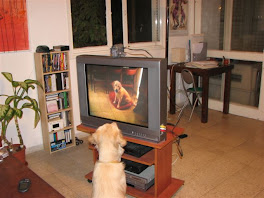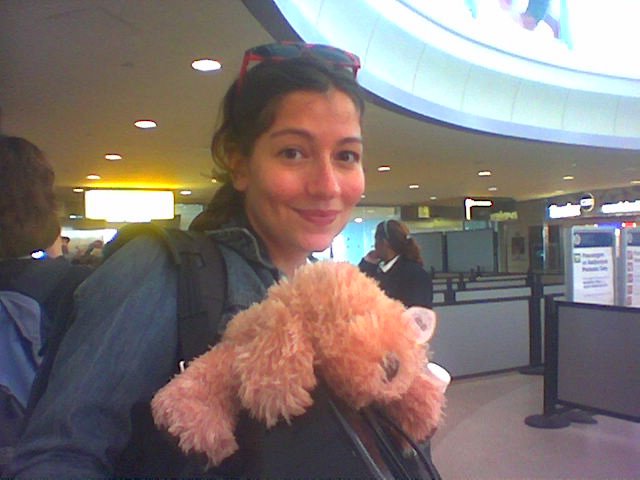I started writing this in response to a posting by Rabbi Arthur Waskow on the National Havurah Committee listserve. But once it started getting a bit lengthy for an email, I decided to put it up here so I wouldn't clog folks' inboxes.
Rabbi Waskow wrote about being invited to speak at a conference at Boston's Old South Church titled "The Apartheid Paradigm: Issues of Justice and Equality." The title is obviously problematic for the Jewish community, and especially Jewish officialdom. Waskow is clear about the differences between the two! Anyway, he was invited to speak after two other "representatives of Jewish officialdom" pulled out in protest. They were objecting to the presence of Archbishop Desmond Tutu, who has compared the Middle-East conflict to South African Apartheid, and the involvement of Sabeel, a Palestinian human rights group that calls itself an "ecumenical grassroots liberation theology movement among Palestinian Christians."
(***Right now I'm reading Tracy Kidder's "Mountains Beyond Mountains" about the amazing, super-hero Doctor Paul Farmer, and his work with impoverished communities in Haiti and elsewhere. Farmer is inspired by liberation theology, and I've become inspired myself, albeit not in a Christian way! Check out the helpful Wikipedia definition of the philosophy.***)
Anyway, if you like, you can read Rabbi Waskow's full account here. The following is my response.
When I think of American Christian relations with Israel, it's usually the Right-wing/Evangelical devotion, financial and otherwise. It's problematic, especially when I heard that a lot of the money for Nefesh B'Nefesh, which helped fund my Aliyah, came from such Evangelical groups. I can't understand why the Boston Jewish "officialdom" would reject the opportunity to engage a large and progressive Protestant congregation on this issue, especially when the conference in question (and its problematic title) demands a Jewish response. Just what is so controversial about Sabeel? Their call for refugee return? It seems like a perfectly understandable position for a Palestinian human rights group to take, even if it may not be tenable if-- I mean, when!!-- a treaty or agreement between Israel and the Palestinians is forged. I've been aware of the difficulty of Israel's "Right of Return" for Jews since I befriended a Palestinian German many years ago at a music festival. Both his grandmothers lived in the Palestinian territories, yet he had never been himself. "You can go anytime you like," he said to me, not unkindly, but with a kind of wistful smile. In that context, I can understand this statement of Sabeel's on their website:
"Israel's 'Law of Return' which allows any Jewish person to immigrate to Israel while denying Palestinians the right of return to their homeland is immoral and discriminatory."
My only disagreement with Rabbi Waskow is with the statement he suggests Boston's Jewish officialdom should have made in response to the conference:
"And we think it important to point out that applying liberation theology and all the vivid rhetoric about Jesus' crucifixion raises deep dangers in the Israel-Palestine context, strikes a deep nerve of Jewish pain from centuries when Christian charges that the Jews killed Christ, killed God, led to rivers of shed Jewish blood."
I have to say, I don't quite get this. From the little I've read about liberation theology, it seems like a perfect jumping-off point for dialog between Christians and Jews. For me, social justice is one of the defining ideals of Judaism. I don't see anything about liberation theology that suggests the charges that the Jews killed Christ. Is there something I'm missing?
Living in Israel didn't do anything to simplify my feelings about the conflict. I heard the boom of a suicide bomb not far away from me, and the resulting symphony of sirens. I understand the Israeli reliance on the military, and the instinct to keep as far away from "those people" as possible. I rarely saw on Israeli news what life was like on the other side of the Wall (oops, sorry. I mean, the Fence!) even though it was going on less than 15 miles away from where I was living. But American Jews can't keep being so afraid to criticize Israel, and can't keep going on pretending Palestinians brought this upon themselves. Israelis criticize Israel all the time!! Honestly, I feel like our fear of real engagement with the problems of the Occupation and Settlements actually divides the two communities (American Jewish and Israeli) more than if we spoke freely about our concerns. Also, it makes us look hypocritical if we take stands on human rights issues all over the world, and look the other way instead of facing the reality and repercussions of Israel's policies.
Families stage interventions to help each other. I'm not saying we should, or can, do anything like that. What would an intervention look like anyway, especially if we don't believe in military solutions to human rights issues? But criticism is healthy. And admitting to "outsiders," i.e. Christians or- gasp!- Muslims that we, too, see these issues, which are so clear to everyone else in the world, does not mean we aren't committed to Israel's future.
Subscribe to:
Post Comments (Atom)



2 comments:
Glad to get a chance to reconnect. I agree with your perspective, but if you read Arthur more carefully you will see that neither he nor the original Jewish speakers were to be part of the actual conference. He spoke the day after the conference at the church which hosted (but I don't think even co-sponsored) the conference.
Jeff Marker
what good common sense you have!! And how difficult it must have been to express yourself so well! We could discuss this all weekend when you're here next month. Love, Aunt B.
Post a Comment